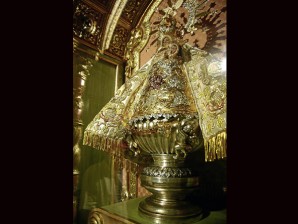Queenly vest for Bicol’s ‘Ina’

VESTS of the Our Lady of Penafrancia which are used during special occasions are displayed at a museum for public viewing. JUAN ESCANDOR JR.
NAGA CITY—The image of Bicolandia’s patroness, Our Lady of Peñafrancia, is a little more than a foot high but appears radiant like a queen in a glittering vest made of special fabrics sewn with real silver and gold threads.
The handcrafted vest, worn during the celebration of the 300-year devotion to “Ina” that culminated in September last year, is patched with two ivory plates carved with a tiny bas relief of the iconic image and the Divino Rostro (Holy Face).
It, however, is worn only by the original image that is hidden from the public in a restricted prayer room within the compound of the Basilica Minore, its permanent home.
‘Manto’
Each year from September to mid-October, the Ina draws millions of pilgrims and devotees who believe in her miraculous power and the power of protection of her vest called “manto.”
Article continues after this advertisementCatholics celebrate the nine-day religious feast starting on the second Friday of September and culminating on the third Sunday of September in a fluvial procession at the Naga River.
Article continues after this advertisementMsgr. Romulo Vergara, rector of the Basilica Minore, said the vests symbolize the protection the patroness gives to her devotees.
“It’s akin to the protection a mother hen gives to its chicks. In times of difficulties, we attribute so many things to Ina and ask for her protection and intercession,” he said.
Replicas
Vergara said replicas of the original image were used for different intentions while the one used during the Peñafrancia fiesta processions in September is garbed with a vest coated

THE TERCENTENARY vest is the most precious among the vests worn by the original 300-year-old image of the Our Lady of Penafrancia. It was donated by business tycoon Manny Pangilinan and lawyer Paul Guico. JUAN ESCANDOR JR.
with fiberglass to withstand the wiping of devotees.
The original image, however, was the one used last year as it passed the “Porta Mariae,” a commemorative arch or symbolic door built at the Naga Metropolitan Cathedral to mark the 300-year journey of Marian devotion in Naga City.
The primary trustee of the image of Ina for 10 years now, Vergara said it was only during his term as rector when the vests worn by the original image were listed, properly accounted for and kept.
Sr. Eppie B. Cantuba, caretaker of the vests, said she has some 30 vests with intricate designs intended as museum pieces and several other plain vests borrowed by devotees who wrap them around persons suffering from illnesses.
Borrowers
“At least 10 plain vests are borrowed every week, which are returned after two or three weeks or even more, depending on the kind of illness,” she said.
If a certain vest is borrowed for quite a lengthy period, it is returned but another one is given as substitute for the the devotee who still has need for it.
On the other side of the Naga River, across the Basilica Minore, the Our Lady of Peñafrancia Museum houses some more vests Ina had worn on several important occasions.
These include a ripped-off vest, one worn during Ina’s coronation in 1924 and another worn in 1999 during her 75th year of coronation.
Tercentenary vest
But the most precious is the tercentenary vest donned by the original image, which was donated by business tycoon Manny Pangilinan and lawyer Paul Guico, Cantuba said.
Vergara said the original image has not been viewed publicly since it was stolen on Aug. 16, 1981, and returned to the basilica on Sept. 17, 1982, just in time for the culmination of the religious feast.
“For security and to protect the delicate santol wood, the original image has to be kept safe in this restricted prayer room.”
The Peñafrancia image was first introduced in Naga in 1710 by Spanish priest Miguel Robles de Covarrubias.